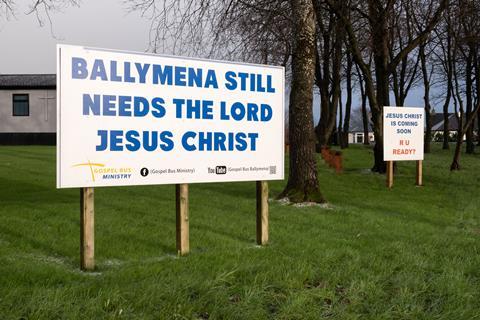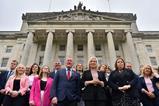Nothern Ireland is far more Christian than others parts of the UK. David Smyth takes a closer look at the data

In many ways Northern Ireland today is much like other parts of the United Kingdom or Ireland, but we are very different when it comes to religious identification and practice.
The 2021 census data for England and Wales shows that 46 per cent of the population identify as Christian. For Northern Ireland, it was 80 per cent.
More people will go to church this week than attend an Irish League football match all season
Religion has shaped our past - for better and for worse - and remains an integral part of the social, political and cultural fabric of life.
The census results sparked our curiosity and prompted us to do some further research, which resulted in Good News People, a new report on Northern Ireland and the evangelicals that live here.
The report features research from two sources: a weighted poll of the general population, conducted by a professional polling company, and a self-selecting survey of over 2,000 practising Christians.
The religious landscape
Here’s what we found:
One in every two people in Northern Ireland describe themselves as a practising Christian. This very high figure can, in some part, be explained by the much higher proportion of Catholics than in other parts of the UK, who were more likely to describe themselves this way (62 per cent, compared to 46 per cent of people from a Protestant background).
One in five people in Northern Ireland, consider themselves to be an evangelical Christian.
Each week in Northern Ireland, 35 per cent of people pray, 23 per cent go to church and 13 per cent read the Bible. This week, more people will go to church than will attend an Irish League football match all season.
Around 57 per cent of people don’t go to church. Half of this group have no intention of going, but a third would be open to attending a church service.
Defining evangelicals
In our survey, around 83 per cent of responses came from a group who could be described as ‘classic’ evangelicals. More than 90 per cent go to church, pray and read the Bible every week. About 55 per cent volunteer at church, and their churches are involved in providing pastoral, practical and spiritual support in the community.
When it comes to classic evangelicals and socio-political issues, 92 per cent disagree or strongly disagree with the statement that “abortion should be available for any reason”, compared to 34 per cent of the general population.
Evangelicals are a sizeable minority who are committed to their local churches, communities and wider society
In addition, 81 per cent agree or strongly agree that asylum seekers, refugees and other newcomers should be supported in practical ways to feel welcome in our communities, compared to 56 per cent of the general population. 89 per cent agree that people should be free to express their beliefs in the workplace. This compares to 54 per cent of the general population.
It’s clear that evangelical Christians are a highly committed minority of people who differ from the general population on some contentious cultural issues. However, 65 per cent of the population agree or strongly agree that there is a role for faith in society. Another clear point of agreement is that more than 80 per cent of both the general population and evangelicals agree that more effort is needed to encourage peace and reconciliation in NI society.
For good and ill
Our research found that lots of people from across the breadth of the Church identify as ‘evangelical’. Unsurprisingly, we are not universally received with open arms. Some associate us with American right-wing supporters of Donald Trump or, more locally, a kind of fundamentalist Christianity wedded to British loyalism.
We did find, however, that people think differently about the evangelicals they encounter in the media and those that they know personally. The most common words people used to describe evangelicals in the media were ‘religious’, ‘extreme’ and ‘loud’. For those they knew personally the words were ‘friendly’, ‘honest’ and ‘kind.’ While it’s clear that we have work to do when it comes to our discipleship, witness and basic communication, in many cases, personal relationships can override public perceptions.
The word ‘evangelical’ comes from the Greek for “good news”. We believe that evangelicals are good news people, a sizeable minority who are committed to their local churches, communities and wider society. We care about poverty, the protection of human life, marriage, refugees and reconciliation. We are similar to our neighbours, yet distinctive in more than a few ways too.
This research was not just commissioned to sit on a shelf or on our website – our prayer is that it will become a springboard into conversations about discipleship, evangelism and our witness in the public square.
Commenting on the report, Gladys Ganiel, a professor in the sociology of religion at Queens’ University Belfast, said: “These surveys remind us that those seeking to understand Northern Ireland must not neglect the role of religion – either in politics or in everyday life.”
This is our hope too, along with the prayer that some might even be curious to find out more about this good news God for themselves.




































No comments yet